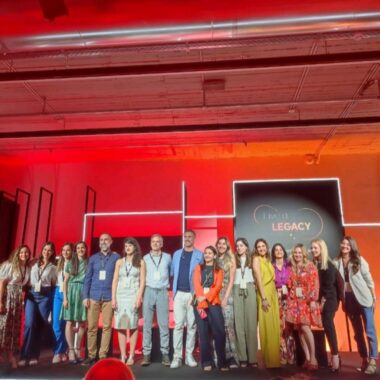03/04/2023
“Without leaps of imagination or dreaming, we lose the excitement of possibilities. Dreaming, after all is a form of planning.” – Gloria Steinem
What kind of futures do we envision for ourselves, our societies, our workplaces? What role will tech play? How can these futures be shaped by justice, care and sustainability? How can these futures be feminist and just? And: how do we get there?
These were the questions we asked ourselves and our participants during the MozFest 2023 Workshop „Towards feminist digital futures – an interactive foresight workshop“ co-lead by Anastasia Karagianni, co-founder of DATAWO and Corinna Vetter, feminist tech expert at SUPERRR Lab.
Feminist Tech Policy
For now, the inequalities of our analogue world are transferred and increased online and by digital devices. Technological progress has not found answers to the current multiple crises of our times.
In this workshop we introduced Feminist Tech Policy as an analytical tool which informs our imagination for better digital futures. A Feminist approach to tech policy questions power structures and fights for a fairer distribution of power. Feminist Tech Policy takes a look at digitalisation in society as a whole and analyses it in terms of patterns of discrimination and power structures. It critically questions whether the use of technologies is necessary and purposeful.
Feminist Tech Policy has three core goals:
- Shape digital policy as social policy, because it concerns our society and how we want to live.
- Move away from the narrative of progress through technology,Away from “higher, further, faster” to “more sustainable, equitable, people-centred”.
- Open up technology debates to those who are most affected by it.
One of the most pervasive yet invisible forms of violence
For the Mozfest workshop, we want to apply this feminist lense to one of the most pervasive yet least visible human rights violations: Gender-based violence (GBV). It includes physical, sexual, mental or economic harm inflicted on a person because of socially ascribed power imbalances between people with different gender identities. As such, GBV is an important topic to focus our feminist policies on since it significantly affects groups of people who are under increased risk online, like marginalised groups of people (e.g. sex workers, refugees, migrants etc.) The forms GBV can take online include Cyber bullying, Cyber sexual harassment, Privacy leaks or Hate speech. Tech-facilitated Gender-based violence (TGBV) is a pervasive issue, globally 38% of women have experienced TGBV personally[1] and the result often is withdrawal from online spaces or self-censorhip online.[2]
Imaginging GBV-free futures together
In the Mozfest workshop, we applied feminist tech approaches and the knowledge of the pervasiveness of TGBV to the future. Specifically, we visualized online spaces in 2030 in which TGBV does not exist due to a value-based, feminist approach.
We approached this scenario through small group work in which the groups first had determine their core value which they then applied to the future scenario.
In the first round of discussions we approached ‘’reparation’’ as the practice of undoing standard power asymmetries between those who make, and those who are affected by algorithmic systems, also related to the values of transformative justice and intersectionality. As such, we realised that reparation is built on the need for justice, which is related to the demand for respect of rights, while trust is required (trust in the law, the judicial system, etc.). However, reflecting upon that we acknowledged that this is an institutional-based approach and does not provide options for more radical avenues, where the society as a whole envisions a common feminist digital future for all. Therefore, having a community-based approach, we concluded that solidarity should be the value that we need to invest and focus on.
The second round of discussions applied this core value to digital futures. Focusing specifically on TGBV on social media platforms, we tried to apply the principle of ‘’solidarity’’ in this context. Through several reflections we noticed that ‘’solidarity’’ is meaningfully needed for the creation of safe spaces, given that some particular groups of people are under greater risks than others (e.g. sex workers, minors, transgender and non-binary persons etc.) We dug deeper into that and discussed on the imbalance of power between users and big tech companies that design such platforms. This lead us to the scenario where the structures of social media platforms based on ‘’solidarity’’ would be designed commonly, which would mean that the community would be involved in the discussions about the development and deployment of these technologies, while all the decisions would be based on consensus. In this way, we could come to better alignment on the individual and collective level about what is the social media app, how they reflect our ideas and needs.
Future Outlook
We at SUPERRR and DATAWO hope to make these futures a reality! Too often, civil society is swimming behind the wave of changes caused by Big Tech and we mainly hope to mitigate the worst societal consequences. We propose an alternative approach: imagine positive tech futures together and as a second step find strategies to get there. As TGBV is pervasive across the whole world, we hope to concentrate on this topic and together create tangible alternative solutions to the status quo. We aim to promote values to design alternative digital (public) spaces that reflect and service our needs.
Further resources:
- Feminist Tech Policy Website, SUPERRR Lab
- DATAWO Website
- UK Government Futures Toolkit for Policy Makers
- A feminist dictionary in AI, a Mozilla initiative
*This blog-post was co-authored by Corinna Vetter from SUPERRR Lab and Anastasia Karagianni from DATAWO.
Illustration credits: Filipa Maceira from Ousa Collective
[1]https://endcyberabuse.org/orbits/
[2]https://eige.europa.eu/publications/combating-cyber-violence-against-women-and-girls





